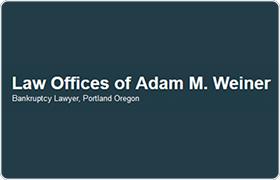Gates Reorganization Lawyer, Oregon, page 2
Sponsored Law Firm
-
 x
x

Click For More Info:
-
Law Offices of Adam M. Weiner
8624 SE 13th Ave Portland, OR 97202» view mapBankruptcy & Debt Premier Bankruptcy Attorney
Life doesn’t always have to be hard. Consult with a bankruptcy attorney who looks out for your best interests. Call today to begin the process for a fresh financial start.
503-719-5123
Not enough matches for Gates Reorganization lawyer.
Below are all Gates Bankruptcy & Debt lawyers.
Kevin Dale Swartz
Child Custody, Consumer Bankruptcy, Bankruptcy, Personal Injury
Laura R Zaro
Bankruptcy
Status: In Good Standing *Status is reviewed annually. For latest information visit here Licensed: 8 Years
Eric Wayne Olsen
Non-profit, Consumer Bankruptcy, Bankruptcy, Personal Injury
Status: In Good Standing *Status is reviewed annually. For latest information visit here Licensed: 47 Years
Eric Wayne Olsen
General Practice
Status: In Good Standing *Status is reviewed annually. For latest information visit here Licensed: 20 Years
Ray Devon Hacke
Child Custody, Bankruptcy & Debt
Status: In Good Standing *Status is reviewed annually. For latest information visit here Licensed: 14 Years
Bruce L Byerly
Bankruptcy & Debt, Accident & Injury
Status: In Good Standing *Status is reviewed annually. For latest information visit here Licensed: 53 Years
John Russell Garner
Mass Torts, Workers' Compensation, Family Law, Bankruptcy, Personal Injury
Status: In Good Standing *Status is reviewed annually. For latest information visit here Licensed: 11 Years
Jana Lei Gunn
Wills, Estate, Guardianships & Conservatorships, Bankruptcy
Status: In Good Standing *Status is reviewed annually. For latest information visit here Licensed: 24 Years
Robert J Gunn
Lawsuit & Dispute, Government, Criminal, Bankruptcy & Debt
Status: In Good Standing *Status is reviewed annually. For latest information visit here Licensed: 53 Years
Kevin Travis Christiansen
Election & Political, Labor Legislation, Administrative Law, Credit & Debt
Status: In Good Standing *Status is reviewed annually. For latest information visit here Licensed: 26 Years
 Adam M. Weiner Portland, OR
Adam M. Weiner Portland, OR Practice AreasExpertise
Practice AreasExpertise